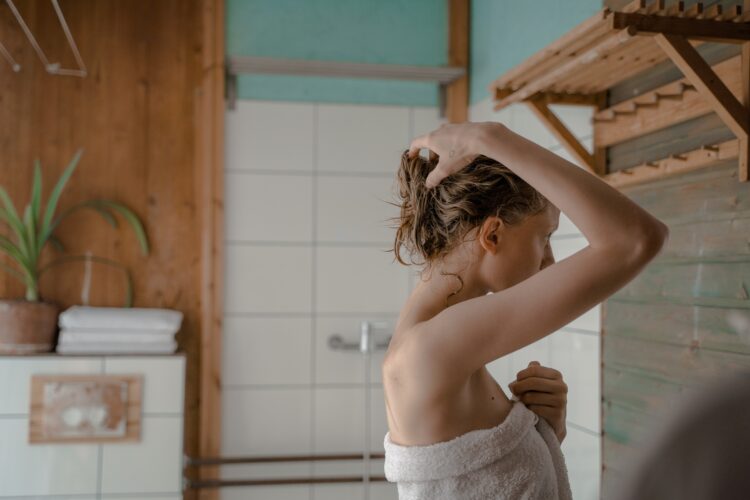Celebrity Hairstylist Trudy Hayes explains how often you should wash your hair depending on your hair type, and shares her top hair care tips
The world of hair care is filled with its fair share of myths, especially when it comes to washing hair. From the popular belief that daily washing will strip your hair’s natural oils, to the solution of delaying washes to achieve less-oily hair, we have heard it all. Thankfully, we have celebrity hairstylist and founder of Raven Haircare, Trudy Hayes, on hand to sort the hair care facts from fiction, and to tell us exactly how often you should wash your hair, depending on your hair type.
Check your hair type
Firstly, it is important to understand what type of hair you have, from fine, medium, to coarse. Just like matching your skincare products to your skin type, the same applies to your hair.
To check what hair type you have, Trudy recommends the following guide: If you can easily see your scalp, you have fine hair. If you can see your scalp partially from underneath your hair, you have medium hair. If you can hardly see your scalp, you have thick hair.
Advice for fine hair
If you have fine hair, Trudy recommends washing your hair daily with a mild shampoo that has a pH level of 5.5, which is the ideal pH level for scalp health.
Having fine hair means your hair strands have a small diameter, and as such, you have more individual hair strands. As each hair strand has its own oil gland, fine hair can get oily quickly, and daily washing is often necessary to keep the scalp clean.
As for the belief that daily washing strips your hair’s natural oils, this is not as straightforward as it seems, according to Trudy:
“This myth is both true and false. We are bombarded with marketing about lovely, fresh hair and fancy shampoos. People tend to not only over-wash their hair, but to over-wash with either the wrong shampoo or with aggressive force.
“It’s important to look for a mild shampoo if you wash your hair everyday. Daily washing will clean the scalp but it can dry out the ends if the pH balance of the shampoo is too high.”

Advice for medium hair
For those with medium hair, Trudy recommends washing every second day: “[Medium hair] is the most forgiving and you can get away with the most with this hair texture.”
However, Trudy adds that a regular washing routine is still important to avoid any future hair issues like dandruff, irritation, or scalp build-up. She recommends a balancing shampoo that cleanses the scalp but nourishes the ends at the same time.

Advice for coarse hair
Coarse hair has the widest strand diameter, and as such, it is the thickest of all hair textures. It tends to be less oily than fine hair, and if you have coarse hair, you may be able to go a couple of days without your hair looking or feeling greasy.
This is because your hair strands can handle oil production much better than fine hair can, but the trade-off tends to be that coarse hair is prone to moisture evaporation and dry ends.
Coarse hair is also associated with wavy or curly hair types, which tend not to get greasy as quickly as straight hair. Despite appearing less oily, it is still important to regularly wash your hair to maintain scalp health, says Trudy, who recommends products that contain oils such as argan or keratin.
“Curly or thick hair needs the natural oils from the scalp to moisturise the hair shaft, and that takes more than 24 hours. I advise washing your hair once or twice a week with a moisturising shampoo to keep the hair and scalp hydrated.”

Advice for coily or Afro hair
For those with coiled curly or Afro hair, Trudy recommends washing every seven to ten days.
“Afro hair needs time to allow the natural oils from the scalp to run through the hair shaft. This keeps the hair hydrated and moisturised.”
Coiled curly or afro hair is often the most fragile, and tends to be dry and brittle. This is because curly strands are delicate and porous, meaning they do not absorb and hold moisture like other hair types do.
Trudy recommends looking out for products containing nourishing oils like avocado, jojoba, shea, and argan, while ingredients like sulphates (sodium lauryl sulphate and ammonium lauryl sulphate) and alcohol (ethanol and isopropanol) should be avoided.
“This advice applies to 4C coils too (the curliest of hair types). Consider applying an oil or conditioner before shampooing, and use a protein-based conditioner to protect the hair shaft.”

Advice for ageing hair
As you age and your body experiences changes, so too does your hair. The natural reduction of oestrogen levels leaves your skin and hair drier, according to Trudy, who adds that going grey and losing your hair’s natural pigment makes your hair coarser.
“If this is your hair type, your hair needs the natural oils from your scalp to run through the hair strands, so the hair doesn’t dry out.
“Washing your hair twice a week is enough. Using a moisturising shampoo and conditioner and adding oils to your styling routine helps to keep your hair manageable.”

Advice for thinning hair
Hair loss is something no one desires, yet anyone can be susceptible to it.
“Hair thinning can be scary and there are so many reasons this happens; from hormones, stress, post-pregnancy, menopause, excessive dieting, to alopecia,” Trudy says.
To support hair growth, she recommends washing your hair daily with products that contain biotin to keep the scalp clean and to allow stronger hair strands to “push through”.
“[Washing your hair daily] seems counterproductive but it is so important. Massaging the scalp to stimulate blood flow to the head will also give the new hair follicles the blood rush they need to encourage new growth. Take the time to do this.”

Advice for scalp issues
While understanding the best hair cleansing routine for your hair type is important, there is an outlier that can sway these guidelines, namely: scalp problems.
“People who suffer from scalp issues like psoriasis, dandruff, or dry skin need to wash their hair daily with a medicated or mild shampoo. This prevents skin flakes and debris from building up and ensures a healthy scalp and cell turnover,” Trudy says, adding that those who have scalp issues should look out for shampoo with salicylic acid to remove scalp build-up.
Why is scalp health so important? According to Trudy, a healthy scalp means healthy hair:
“The scalp needs a clean environment for new hair to grow. If the follicles become clogged or inflamed, the hair shaft gets thinner. If you don’t need to wash your hair everyday, then brush it each night before bed with a wooden comb to remove dirt, loose hair, and dead cells from the scalp.”

“Remember to spray underneath your parting, fringe or crown, otherwise you will be left with a chalky mess. Shake the hair after to remove the dusty particles. I love Kevin Murphy Fresh Hair, Batiste, and Living Proof Perfect Hair Day.”

Main image by Ron Lach on Pexels








